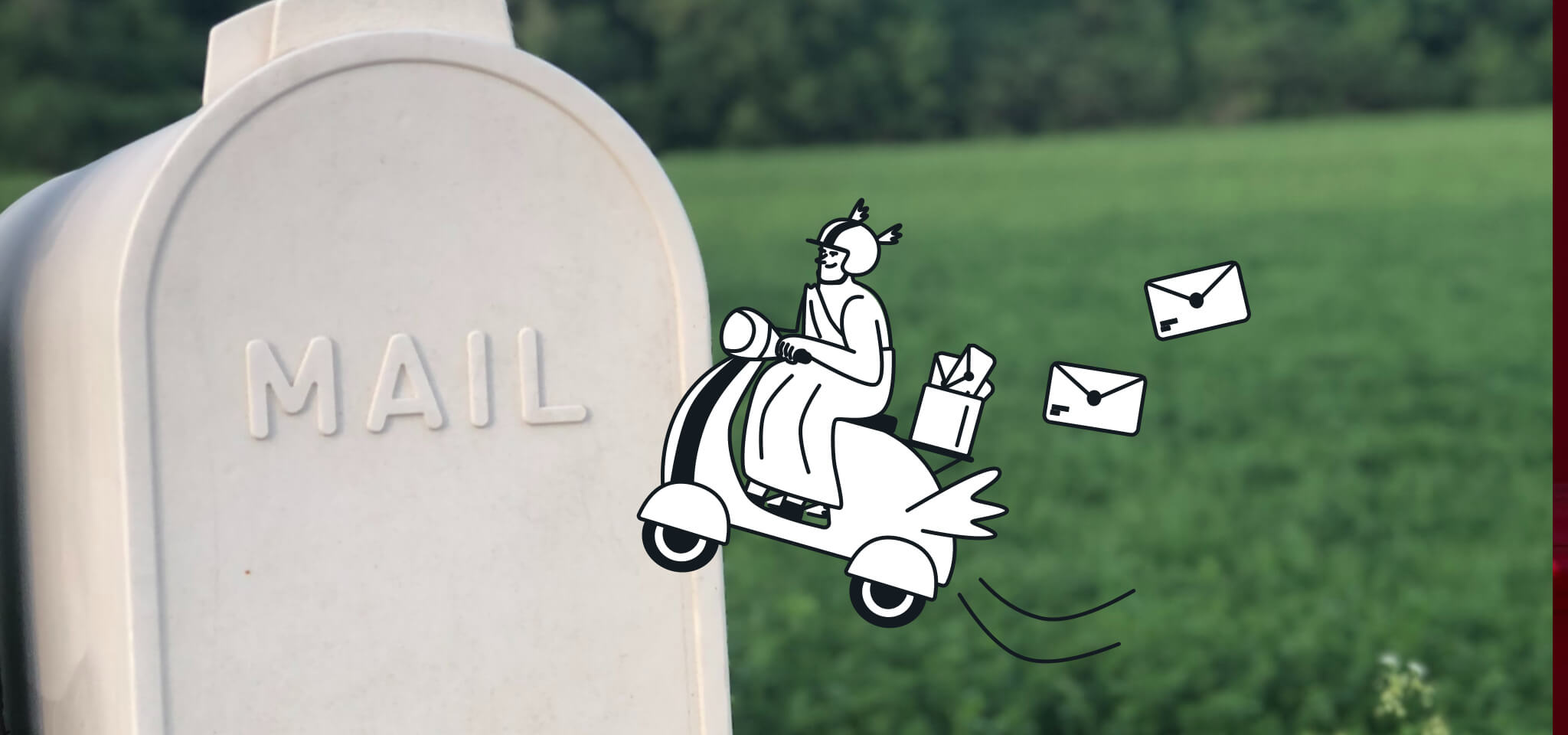Email best practices
Top email marketing trends for 2022
Wondering what email has in store in 2022? We've recapped all the email marketing trends for 2022 in a post so you can enhance your strategy.

PUBLISHED ON
To the outsiders, it can sometimes feel like email hasn't changed that much since it was created. Maybe this is why some are so persistent in predicting its death every time a new flashy communications platform comes around. How many times have we heard the "it's the end of email" mantra?
And yet, here we are, 51 years later, getting ready to uncover new email marketing trends that will help you set your email program apart in 2022 and build stronger relationships with your customers.
So if, like us, you also think the end of email is just another conspiracy theory, worry not. We've recapped all the essential email marketing trends so you can start the New Year off strong: from old friends that make this list every year – we're looking straight at you, personalization – to new developments that got us all talking and theorizing in the second half of 2021 (open rates, anyone?).
Without further ado, please welcome your email marketing trends for 2022.
Table of contents
Better email accessibility
Accessibility has been a big trend in the tech world for the last few years, with new developments making it easier for people with disabilities to communicate and access information using digital means. With one billion people in the world estimated to have a vision impairment, implementing accessibility best practices in digital communications allows brands to craft messages all their customers can read and digest.
In the email space, accessibility has become more popular in the last few years, but it’s still not the norm. In fact, only 57% of companies consistently focus on developing accessible emails, according to a recent study by Mailjet, Mailgun, Email on Acid, and Ascend2.
But with more resources and tools available to craft, deploy, and test email accessibility, we predict 2022 to be the year brands take that much-needed next step and finally invest in consistently designing fully accessible emails.
"It’s been encouraging to see the email industry say, ‘You know, this matters, and not just because it’s financially important.’ At the end of the day, if you’re creating something that more people can access, it’s worth the effort."
Paul Airy Accessibility and Usability Consultant
New ways to measure success
Back in June, the whole email world went into panic mode when Apple announced its new privacy features for the Apple Mail app. Once again, there were talks about email being doomed, and email experts everywhere engaged in a lengthy discussion about the worth of open rates as a success metric for emails.
Well, while the Apple Mail Privacy Policy proved to be less disruptive than we anticipated, the truth is the latest developments in email have deemed open rates a little unreliable when it comes to measuring the success of our campaigns.
In 2022, the focus will be on more impactful metrics that allow marketers to truly identify what's working and what isn't working in their email strategy. But first, email marketers will need to clearly establish their email campaign goals. Is the goal of an email just to be opened? Or do we want customers to click-through and take action? For the former, open rates could be enough, but the latter will require marketers to focus more on what happens next.
"If you haven’t already, establish an attribution system using UTMs for tracking. Work with your team to track web traffic from email, sign-ups, downloads, purchases, etc. This will help show the impact of email on your organization."
Julia Ritter Email Marketing Manager, Sinch Mailjet
More dark mode in email design
The growth of dark mode over the last few years is not surprising. With people spending more time at home and on their computers, the benefits of dark mode have made it a highly demanded feature that's now present on most apps and operating systems.
When it comes to email, our recent survey showed that 44% of marketers are already considering dark mode during production. This makes sense: many users already choose dark mode display on their devices at least part of the day. But even among those that don't actively select it, mobile phones now offer well-being features that automatically invert colors on emails – potentially, an email designer’s nightmare.
Nike designs its emails in light and dark mode
In 2022, dark mode will be much more a requirement than a trend in itself, with email designers and email developers desperately looking for solutions for common dark mode challenges, including logo display and brand consistency.
“If there are small discrepancies in dark mode, it’s not the end of the world. Unless it’s a very important element of the email, it may not be worth trying so hard.”
Francois Sahli Sr. Graphic Designer, Sinch Mailjet
Growth of email interactivity
Interactivity – the Holy Grail of email marketing. In a way, it feels like we have been anticipating the rise of interactivity for a while now. And yet, it doesn't look like we're there yet, does it?
To be fair, the use of AMP for Email and interactive elements on email campaigns has been slowly on the rise over the last few years. But progress has been slow, mostly due to the complexity of developing interactive elements and the lack of consistency across email clients.

See the live email at Really Good Emails
However, those that have tried it have started to reap its benefits. One of our clients, an early AMP adopter, has seen a 35% increase in sales thanks to these interactive elements. With such potential, we can only expect interactivity to continue to grow in email in 2022.
“AMP for Email is an interactive marketing tactic that boosts engagement. One of our earliest senders of AMP saw 35% increased engagement in emails. It makes a difference in how people are interacting with brands because everything remains in the email.”
Kate Nowrouzi VP of Deliverability & Product Strategy, Sinch Mailgun
Larger BIMI adoption across brands
The inbox has become a muddy battlefield where brands sometimes struggle to come out victorious amid worthless emails, spam, and phishing attempts. It isn't pretty.
BIMI helps prevent email spoofing and increases email engagement by displaying a logo next to a brand’s email in the inbox, letting users know the email comes from a legitimate source.

Brands like CNN use BIMI to ensure people recognize their emails
And while BIMI has been around for years, it wasn’t until 2021 that it received the final seal of approval for email developments: Gmail support. Earlier this year, after a year-long pilot program, Google announced it would officially support BIMI logos, which makes the protocol much more interesting to brands.
“As ransomware and phishing attacks continue, I believe next year we’ll see a rise in businesses adopting BIMI as a solution for customers to know their email is the real deal.”
Kate Nowrouzi VP of Deliverability & Product Strategy, Sinch Mailgun
Increased data privacy consciousness
Apple's move earlier this year to provide its users with more privacy features shows how seriously big tech companies are taking data privacy. It makes sense, too: consumers are asking for more control over their personal data and want to know how brands are using their personal information.
In 2022, we expect other major clients to follow Apple's lead and put their users’ privacy front and center in the development of new product features. This privacy consciousness will also impact brands, which will need to rethink the type of data they're collecting from their users and how they're utilizing it.
“I think privacy is a huge topic. The days when you could deploy a cookie and track people are ending; that ability that marketers have is dwindling quickly. Apple has been leading this trend and moving Google along. Our theory is that it will make channel marketing way more relevant.”
Josh Odom Chief Technology Officer, Sinch Mailgun
Advanced email personalization
Yes, personalization has been a big trend in the email space for years, and yet it seems like few have cracked the code. Many have actually started applying some personalization to their emails, but brands struggle to offer the tailored experience customers now demand from them.
With a significant increase in email sending volumes during the COVID-19 pandemic and 20% of Americans receiving over 50 emails a day, generic email blasts are just not enough anymore when it comes to converting users. But it's not just about conversions – emails that include advanced personalization are much more likely to generate strong engagement, which can result in much better deliverability overall.
Personalization increases email engagement [Source: Zembula]
In 2022, marketers will continue their quest to offer advanced customization within their emails, leveraging contact properties, AI-powered behavioral data, and dynamic content to provide a hyper-personalized email experience.
“Personalization within email is an absolute win-win. It delivers a much-enhanced customer experience. Great. But for business, it drives both higher email engagement and revenues. Test it for yourself to see.”
Gavin Sherry Head of Deliverability, Bloomreach
Get your email marketing strategy ready for 2022
Seems easy, doesn’t it? Just read through a few posts on our blog, determine what you’ll need to focus on during 2022, and start planning your campaigns. And still, most email marketers struggle to find the key to success in their email marketing strategy. In fact, according to an industry survey from Ascend2 and Mailjet, 72% of marketers would call their email strategy only somewhat successful.
That’s why we’ve put together a report packed with fresh data so you can benchmark your email marketing program against best-in-class marketers and get expert advice to optimize your email strategy in 2022.
Our Inbox Insights 2022 report will feature survey results from best-in-class email marketers, insights on the trends and challenges that will dominate the email world in 2022, and actionable advice from email experts to enhance your email marketing program.
Don’t miss out – sign up for our newsletter now to get our exclusive report directly in your inbox when it launches on January 17!







